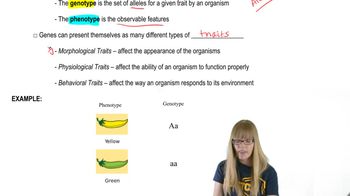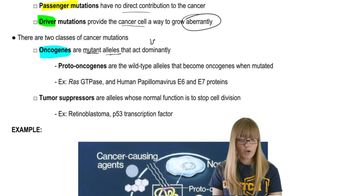Radiation is frequently used as part of the treatment of cancer. The radiation works by damaging DNA and components of the cell. Under what circumstances do you think radiation treatment is a good choice to treat cancer?
Table of contents
- 1. Introduction to Genetics51m
- 2. Mendel's Laws of Inheritance3h 37m
- 3. Extensions to Mendelian Inheritance2h 41m
- 4. Genetic Mapping and Linkage2h 28m
- 5. Genetics of Bacteria and Viruses1h 21m
- 6. Chromosomal Variation1h 48m
- 7. DNA and Chromosome Structure56m
- 8. DNA Replication1h 10m
- 9. Mitosis and Meiosis1h 34m
- 10. Transcription1h 0m
- 11. Translation58m
- 12. Gene Regulation in Prokaryotes1h 19m
- 13. Gene Regulation in Eukaryotes44m
- 14. Genetic Control of Development44m
- 15. Genomes and Genomics1h 50m
- 16. Transposable Elements47m
- 17. Mutation, Repair, and Recombination1h 6m
- 18. Molecular Genetic Tools19m
- 19. Cancer Genetics29m
- 20. Quantitative Genetics1h 26m
- 21. Population Genetics50m
- 22. Evolutionary Genetics29m
19. Cancer Genetics
Cancer Mutations
Problem C.7c
Textbook Question
Based on what you read in this chapter, Can a tumor arise from a single mutated cell? Are all the cells in a tumor identical?
 Verified step by step guidance
Verified step by step guidance1
Understand the concept of tumorigenesis: Tumors often originate from a single cell that has undergone mutations leading to uncontrolled cell division. This mutated cell proliferates, giving rise to a mass of cells.
Recognize that the initial mutation in one cell can cause it to divide abnormally, forming a clonal population of cells derived from that original mutated cell.
Consider that as the tumor grows, additional mutations can occur in different cells within the tumor, leading to genetic diversity among the tumor cells.
Therefore, not all cells in a tumor are identical; they can have different mutations and characteristics due to ongoing genetic changes during tumor progression.
Summarize that a tumor can indeed arise from a single mutated cell, but the cells within the tumor are typically heterogeneous because of subsequent mutations and selection.
 Verified video answer for a similar problem:
Verified video answer for a similar problem:This video solution was recommended by our tutors as helpful for the problem above
Video duration:
3mPlay a video:
Was this helpful?
Key Concepts
Here are the essential concepts you must grasp in order to answer the question correctly.
Clonal Origin of Tumors
Tumors often arise from a single mutated cell that undergoes uncontrolled division, leading to a mass of cells with a common ancestor. This concept explains how one initial genetic alteration can initiate tumor formation.
Recommended video:
Guided course

Cancer Characteristics
Genetic Heterogeneity in Tumors
Although tumors may start from one cell, subsequent mutations during cell division create genetic diversity among tumor cells. This heterogeneity affects tumor behavior, treatment response, and progression.
Recommended video:
Guided course

Descriptive Genetics
Mutation and Cell Proliferation
Mutations in genes regulating cell growth and division can cause cells to proliferate abnormally. Understanding how mutations disrupt normal cell cycle control is key to explaining tumor development and diversity.
Recommended video:
Guided course

Cancer Mutations
Related Videos
Related Practice
Textbook Question
498
views


